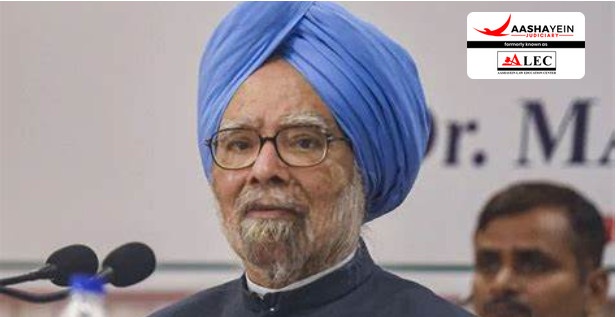Dr. Manmohan Singh, a well-known Congress politician and former prime minister, passed away on Thursday at the age of 92. Singh was admitted earlier that evening to AIIMS Delhi, where he passed away. He was brought to the emergency room, despite attempts to resuscitate him using cardiopulmonary resuscitation (CPR), according to the All India Institute of Medical Sciences (AIIMS), which verified his death. The personification of India's change was Manmohan Singh. His reforms, which he implemented as finance minister in the early 1990s and as prime minister for ten years starting in 2004, opened up the economy, lifted millions out of poverty, and forced the West to see the nuclear-armed country as an ally.
Early age and entry into Politics
Born on September 26, 1932, in a village in Punjab (now in modern-day Pakistan), he experienced the traumatic events of the 1947 Partition as a 15-year-old Sikh boy. His family was among those who fled to newly independent India, leaving everything behind. Despite these hardships, he pursued an exceptional education, studying economics at both Oxford and Cambridge. Over the years, he established himself as a leading technocrat, inspiring many by showing that with education and determination, one could achieve success regardless of background. His vision demonstrated how a market-driven economy could open doors for social mobility and better opportunities. On May 22, 2004, after the Congress Party's election victory, he was sworn in as India’s Prime Minister and began a second term on the same date in 2009.
Career in Congress
Dr. Singh began his career in the Indian government in 1971 as an economic advisor in the Ministry of Commerce and became the Chief Economic Advisor in the Finance Ministry in 1972. Over the years, he held several influential positions, including Secretary in the Ministry of Finance, Deputy Chairman of the Planning Commission, Governor of the Reserve Bank of India (RBI), Chairman of the University Grants Commission, and Advisor to the Prime Minister. From 1987 to 1990, he served as Secretary General of the South Commission in Geneva, showcasing his extensive expertise and dedication to public service.
Over his long political career, Mr. Singh was a Rajya Sabha member from 1991 until he retired in April 2024. Between 1998 and 2004, he served as the Leader of the Opposition in the Rajya Sabha. On the international stage, he represented India at important events like the 1993 Commonwealth Heads of Government Meeting and the World Conference on Human Rights. Although he was re-elected as Prime Minister in 2009, his second term faced criticism due to corruption and financial scandals related to the 2010 Commonwealth Games.
His Role as Prime Minister
As Prime Minister, Dr. Manmohan Singh introduced transformative programs to improve the lives of Indian citizens. In 2005, he launched the Mahatma Gandhi National Rural Employment Guarantee Act (MGNREGA), which provided rural households with up to 100 days of guaranteed wage employment each year. He also implemented the Right to Information Act in the same year to promote transparency and accountability by giving citizens access to public records. Another landmark initiative was the National Food Security Act of 2013, which aimed to ensure affordable food grains for nearly two-thirds of India’s population.
You can also read the latest judgment by visiting [Latest Judgment]
For more information, visit [Aashayein Enquiry Section]
His Role as Finance Minister
Dr. Manmohan Singh served as India’s Finance Minister from 1991 to 1996, during Prime Minister P.V. Narasimha Rao’s leadership. This period was a major turning point in the country's economic history, as Singh initiated significant reforms to liberalize the Indian economy. These reforms not only stabilized India during a financial crisis but also laid the groundwork for long-term economic growth, earning international recognition for their impact.
When Singh took office in 1991, India was on the brink of an economic collapse, with only a few weeks' worth of foreign exchange reserves left to cover essential imports. This crisis was worsened by the decline of the Soviet Union, which had been a critical trade partner for India, providing cheap oil and a market for its goods. To address these challenges, Singh introduced reforms focusing on liberalization, privatization, and opening the economy to market-driven policies.
Prime Minister Rao supported these efforts by launching a new industrial policy. This policy introduced major structural changes, such as allowing foreign direct investment (FDI) up to 51% in priority sectors and removing barriers to foreign technology collaborations. Additionally, the government abolished industrial licensing for most industries, except a few strategic ones, and reduced public sector involvement by disinvesting its stakes in several enterprises. The policy also amended the Monopolies and Restrictive Trade Practices (MRTP) Act, enabling businesses to expand, merge, or set up new ventures without needing prior approval.
Dr. Manmohan Singh’s passing marks a profound loss for India and the world. As a leader, economist, and statesman, he reshaped India’s economic landscape, lifting millions out of poverty and propelling the nation onto the global stage. His life, rooted in resilience and intellectual brilliance, epitomized the transformative power of education and vision. Singh’s contributions, from groundbreaking economic reforms to social welfare initiatives, have left an indelible mark on India’s history. His calm demeanor, integrity, and commitment to the nation will continue to inspire future generations. With his departure, India bids farewell to one of its most remarkable leaders, whose legacy will endure for years to come.

